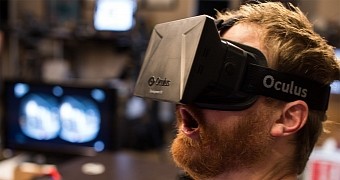In case you have not heard of Oculus Rift until now, you should know that it is a virtual reality display designed by Oculus VR, the company acquired by Facebook in March last year.
Not much has been revealed ever since, nor has Facebook provided any details on what they intended to do next regarding the much-anticipated headset.
However, during the F8 2015 conference, Oculus Chief Scientist Michael Abrash announced that they were still working on developing the device in order to provide users with an unforgettable experience.
Those who attended the F8 conference were given the opportunity to actually try on the device and have a taste of what the amazing product has in store for us.
When will the device be released?
A USA Today reporter was among the lucky people and she declared that “the demo today took me terrifyingly back to the Jurassic era and amusingly forward to an alien landscape.” She also noticed that, unlike previous versions of the device that she had had the chance to put on, this one no longer had a nauseating effect on her.
This means that the company is indeed working hard on perfecting the product before actually releasing it.
To the disappointment of all those present, Michael Abrash didn’t provide any date for when the product might be released for sale, which means that we should not be expecting it anytime in the near future.
During the conference, they released images of the Crescent bay prototype, which was first revealed during the Oculus Connect conference from last year which proved to be quite an impressive item, with features such as improved optics or the 360-degree motion tracking.
Meanwhile, Mike Schroepfer, Facebook’s CTO tweeted saying that they might launch the product this year, but then retracted the statement, implying that he had actually meant a completely different thing. He said that his intention was to let us know that we could experience similar instances of virtual realities thanks to improved computer features currently available.
@tim @vindugoel I know what I meant to say was just this tech is here this year - *not* announcing this game or oculus shipping this year
— Mike Schroepfer (@schrep) March 26, 2015

 14 DAY TRIAL //
14 DAY TRIAL //